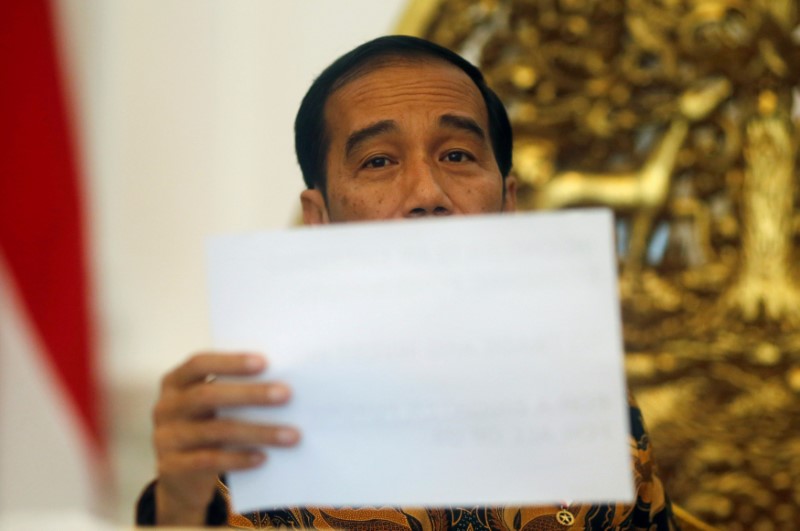By John Chalmers and Eveline Danubrata
JAKARTA (Reuters) - Indonesia's president said on Monday his country remains a model of moderate Islam, countering critics who point to mass rallies by radical Muslims and the jailing of a Christian politician for blasphemy as evidence its reputation is crumbling.
"Pluralism has always been a part of Indonesia's DNA," Joko Widodo told Reuters in an interview at the presidential palace in Jakarta. "Despite many challenges, Islam in Indonesia has always been a force for moderation."
Indonesia's state ideology includes national unity, social justice and democracy alongside belief in God, and enshrines religious diversity in a secular system of government.
Hardline Islamist groups were banned under the authoritarian regime of President Suharto, which ended in 1998, but they have gained ground in recent years, emerging from the fringes of society in the world's biggest Muslim-majority country.
Religious and political tensions spiralled at the end of last year when Islamists led protests by hundreds of thousands in Jakarta against the capital's then governor, an ethnic-Chinese Christian who was charged with insulting the Koran.
Governor Basuki Tjahaja Purnama, an ally of President Widodo, lost his bid for re-election to a Muslim rival in April after months of agitation against him by a radical group, the Islamic Defenders Front (FPI).
In May he was sentenced to two years in jail for blasphemy.
Widodo said Indonesia was "still a model" of pluralism and noted comments on Saturday by former U.S. President Barack Obama - on a personal visit to the country where he spent some of his childhood - that its history of tolerance must be preserved.
"It is very important here in Indonesia, the United States, Europe, everywhere, to fight against the politics of 'us and them'," Obama told a conference in Jakarta.
CAREFUL LINE ON HOMOSEXUALITY
The targets of hardline Islamic groups have included the lesbian, gay, bisexual and transgender (LGBT) community, many of whom have been driven underground by police raids.
With the exception of the ultra-conservative Aceh province, where Islamic law is enforced and two men were publicly flogged in May for gay sex, homosexuality is legal in Indonesia.
But Widodo's own defence minister has branded homosexuality a national security threat and last week a leader of Indonesia's second-largest Muslim group called for a boycott of Starbucks (NASDAQ:SBUX) because of the international coffee chain's pro-gay stand.
The president trod a careful line on the question of LGBT rights, saying that "Indonesia remains a tolerant nation" whose constitution guarantees that everyone's rights are respected and protected.
But he added: "We are the largest majority Muslim country so Indonesia has its own religious norms, unique values and also cultures that must be respected."
ISIS HAS NO PLACE IN INDONESIA
The muscle-flexing of hardline groups has fed fears that Indonesia will become fertile ground for Islamist militants.
Widodo said he would press parliament to move more quickly on passing a new anti-terrorism law that would make it easier to both arrest and detain suspects.
"We need this law," he said, hammering his finger on the table in front of him.
The attempt in May by a small army of Islamic State-allied fighters to overrun a city in the southern Philippines has been widely seen as a bid by the ultra-radical group, on a backfoot in Syria and Iraq, to establish a stronghold in Southeast Asia.
Philippines officials have said there were Indonesians and Malaysians among the fighters who attacked Marawi City, where a battle with government troops has ground on for six weeks.
"ISIS has no place in Indonesia," Widodo said, using a popular acronym for Islamic State.
He noted that Indonesia, Malaysia and the Philippines had agreed to joint maritime patrols to prevent militants moving across their islands, and said he discussed cooperation on a phone call with Philippines President Rodrigo Duterte last week.

"Our security and intelligence agencies continue to work hard to combat this threat. We are also continuing to promote the values of moderate Islam and when I talked with President Duterte last week I said that 'your problem is my problem'.